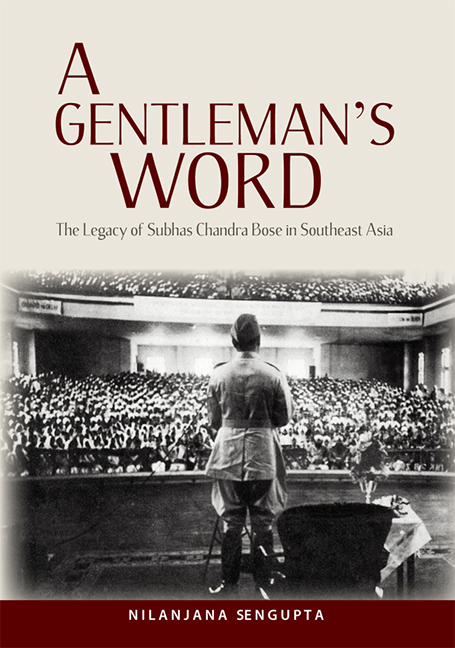Book contents
- Frontmatter
- Dedication
- Contents
- Foreword by S. R. Nathan
- Message by K. Kesavapany
- Message by Joyce C. Lebra
- Preface
- Acknowledgements
- 1 A Journey: A Dream
- 2 An Outsider in the Crescent and a Trial for Treason
- 3 End of a War, Beginning of Others
- 4 We are the Multitudes
- 5 “They Have Done Enough at Home”: Escape from the Shadows
- Bibliography
- Index
- About the Author
- Plate Section
Message by Joyce C. Lebra
Published online by Cambridge University Press: 21 October 2015
- Frontmatter
- Dedication
- Contents
- Foreword by S. R. Nathan
- Message by K. Kesavapany
- Message by Joyce C. Lebra
- Preface
- Acknowledgements
- 1 A Journey: A Dream
- 2 An Outsider in the Crescent and a Trial for Treason
- 3 End of a War, Beginning of Others
- 4 We are the Multitudes
- 5 “They Have Done Enough at Home”: Escape from the Shadows
- Bibliography
- Index
- About the Author
- Plate Section
Summary
Nilanjana Sengupta casts her net widely in this ambitious volume exploring the post-war impact of Subhas Chandra Bose on Southeast Asia. Because the study of Bose has been extensively explored by generations of scholars, Sengupta necessarily addresses some familiar ground.
Throughout the volume we hear echoes of his early spiritualism, secularism and egalitarianism. We hear also references to his mother's worship — extending to Bharat Mata [Mother India] — and his fostering of women's political and military roles, in for example his creation of the Rani of Jhansi Regiment. We encounter again his early political role in Calcutta and its extension to his relations with Gandhi and the Congress, preparing him for an even larger stage in Southeast Asia.
We shift to Burma and Malaya and the embryonic nationalism there in the 1920s under colonial rule and a discussion of the Japanese alliance. Subsequently, for a while the scene shifts to the Red Fort Trials in India and their impact on the British Indian army spread across Southeast Asia.
Sengupta discusses Bose's communication and propaganda techniques, his modern understanding of the mechanisms of mass communication, including his awareness of his personal impact. His emotional and absolute commitment to the goal of military liberation was a significant ingredient of his mesmerizing impact on audiences. The Rebellion of 1857 and the martyrdom of the Rani of Jhansi helped to foster his conviction that the military paradigm was imperative.
Sengupta forges new ground in her discussion of Bose's post-war impact on Southeast Asian leadership, the growth of nationalism, and the burgeoning labour union movement. Throughout Southeast Asia, political organizations such as the MPAJA and labour unions grew in each country, as Sengupta details. The consequence was that British and Dutch post-war attempts to reassert their colonial rule were thwarted by resurgent nationalism. The experience of INA veterans, the personal example of Bose's leadership, and the body of officers trained by the Japanese gave the colonial powers a rude awakening. Southeast Asian nationalism was now an established force in Southeast Asia.
Historians will welcome Sengupta's contribution to our understanding of Bose's continuing impact on the political landscape of Southeast Asia.
- Type
- Chapter
- Information
- A Gentleman's WordThe Legacy of Subhas Chandra Bose in Southeast Asia, pp. xiii - xivPublisher: ISEAS–Yusof Ishak InstitutePrint publication year: 2012

